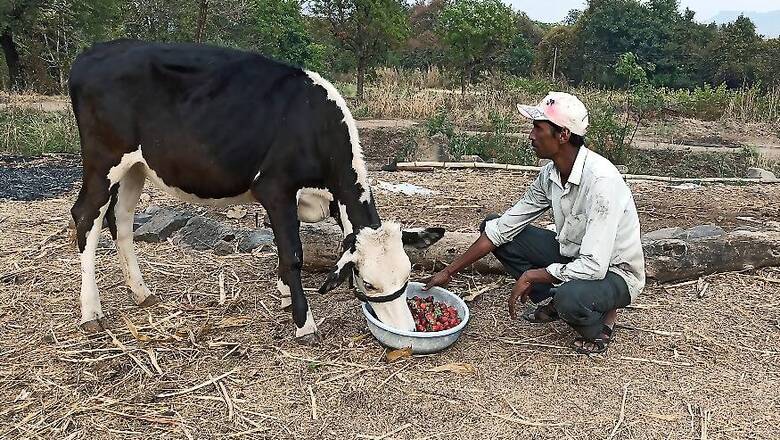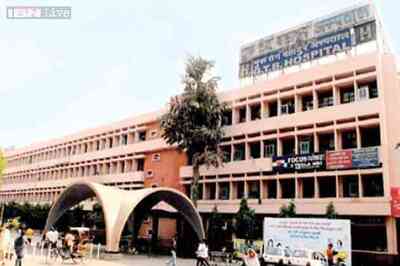
views
A lot of exuberance is being exhibited over the Centre’s decision to amend the Essential Commodities Act, 1955. Likewise, the proposal to bring in a central law to override the Agricultural Produce Marketing Committee (APMC) Act, thereby allowing farmers to sell to anyone, anywhere is being viewed as a much wanted reform. The third measure pertains to the possibility of another legislation to promote contract farming and linking it to futures commodity markets.
Considering that 70 per cent of the rural households are engaged in agriculture, these three measures announced by the Finance Minister Nirmala Sitharaman are part of the 11 initiatives she spelled out to revive Indian agriculture. After all, agriculture is passing through a severe crisis and certainly needs a booster dose in public sector investment. But at this critical juncture, when the lockdown had resulted in a collapse in demand, forcing farmers to throw away, re-plough or feed their cattle with perishable produce like vegetables, flowers, poultry and milk; and with prices of almost all farm commodities slumping in the markets, except for wheat prices in the areas where an assured procurement takes place, what the farmers need is an immediate relief package.
A majority of the measures announced are a continuation of the ongoing programmes/schemes with allocations for some enhanced. Providing Rs 1 lakh crore for farm gate infrastructure, Rs 10,000 crore for micro-food enterprises, another Rs 15,000 crore for dairy infrastructure, Rs 20,000 crore for fisheries development and Rs 13,343 crore commitment for animal disease control like foot-and-mouth disease in cattle, and so on are all welcome initiatives. In addition, Rs 4,000 crore for medicinal plants, Rs 500 crore for beekeeping initiatives, and Rs 500 crore for Operation Green — which is now being expanded to include a number of other perishables besides tomatoes, potatoes and onions — are long-term initiatives, and will take some time to fructify. Many of these initiatives, in any case, have been in the pipeline for several years now.
The Finance Minister said that 8.19 crore farmers had received Rs 2,000 in their bank accounts as the first quarterly installment under the PM Kisan scheme which provides a direct income transfer of Rs 6,000 in a year in three equal installments. Except that, the Rs 2,000 per farmer installment, which was in any case due for the April to June quarter, had been frontloaded in the first week of April, however, does not mean it was an additional relief.
At a time when agriculture had served as the lifeline in the lockdown period, and at a time when people were confined in the safety of their homes, farmers had toiled hard in the crop fields to achieve a record wheat harvest estimated at 106 million tonnes. Overcoming the farm labour shortage, and maintaining the safety norms by staggered mandi operations, the country is also heading for record wheat procurement. At the same time, sowing for kharif crops in many parts of the country has already exceeded the target.
In this time of an extraordinary crisis, when chips are down, agriculture has truly served as the backbone of the economy. For a sector which was reeling under an acute distress for long, the lockdown had clashed with the period of rabi harvest, thereby further compounding the crisis. At this difficult time, I was expecting the government to stand with farmers, not only as a confidence-building exercise but also to partly compensate for the huge losses they had suffered. My suggestion, therefore, is that the government should announce an economic stimulus package for farmers, including a direct income support of Rs 10,000 per farmer (not linked to PM-Kisan scheme) and also provide a bonus of Rs 100 per quintal to wheat farmers. Providing cash in the hands of farmers will help create more demand as the economists have been suggesting, and for the farmers it will also provide them with some resources to plan for the sowing of paddy crop in the days to come.
Now let’s look at the proposal that liberalises agricultural markets. Allowing farmers to have market choices by allowing them to sell anywhere, and to anyone, and as some observers say, to unshackle them from the APMC restrictions, is what free market evangelists had been demanding for long. Although the fine print of the proposed law will spell out the contours, I also see demands for scrapping the APMC Act and to phase out the Minimum Support Price (MSP) that provides farmers with an assured price at least for wheat and paddy in areas where a well-knit APMC mandi network operates. In other words, they are asking for diluting/dismantling the APMC operations.
In a country where only 6 per cent farmers receive MSP and where 94 per cent farmers are in any case dependent on markets, I wonder how is this 6 per cent is strangulating the country’s remaining farmers. In any case, if the markets were as efficient as is being made out, I don’t understand why agriculture should continue to be in a severe distress. What we hear from farmer unions repeatedly is the demand for raising MSP as per Swaminathan Commission recommendations. After all, they know what is good for them. Moreover, in a country where there less than 7,000 APMC regulated markets operate, and as per CII and FICCI the APMC network exists in only three-and-a-half States, it will be interesting to know what stopped the private sector to set up private mandis in the remaining part of the country.
Too much is also being made out about better inter-state movement of agricultural commodities, but these are the questions which need to be deliberated before a central law is enacted. That APMCs have turned into strong cartels is well-known and it certainly needs immediate corrections. But throwing the baby with bathwater is not what is required. All I know is that the same kind of excitement had prevailed when Bihar had revoked APMC Act in 2006. The arguments were the same -- it will bring in private investments, build private state-of-the-art mandis and help farmers with a better price discovery.
Fourteen years have passed, and every year there are reports of unscrupulous traders transporting truck loads of wheat and rice to be sold in Haryana and Punjab, where at least they get an assured MSP. If Bihar had instead invested in setting up a network of APMC mandis, and provided farmers with an assured MSP, I am sure the rate of outward migration from Bihar would have remained subdued. The pressure to carry migrant workers back home to Bihar now would have been far less if agriculture, which engages more than 80 per cent of its population, had been economically viable.




















Comments
0 comment